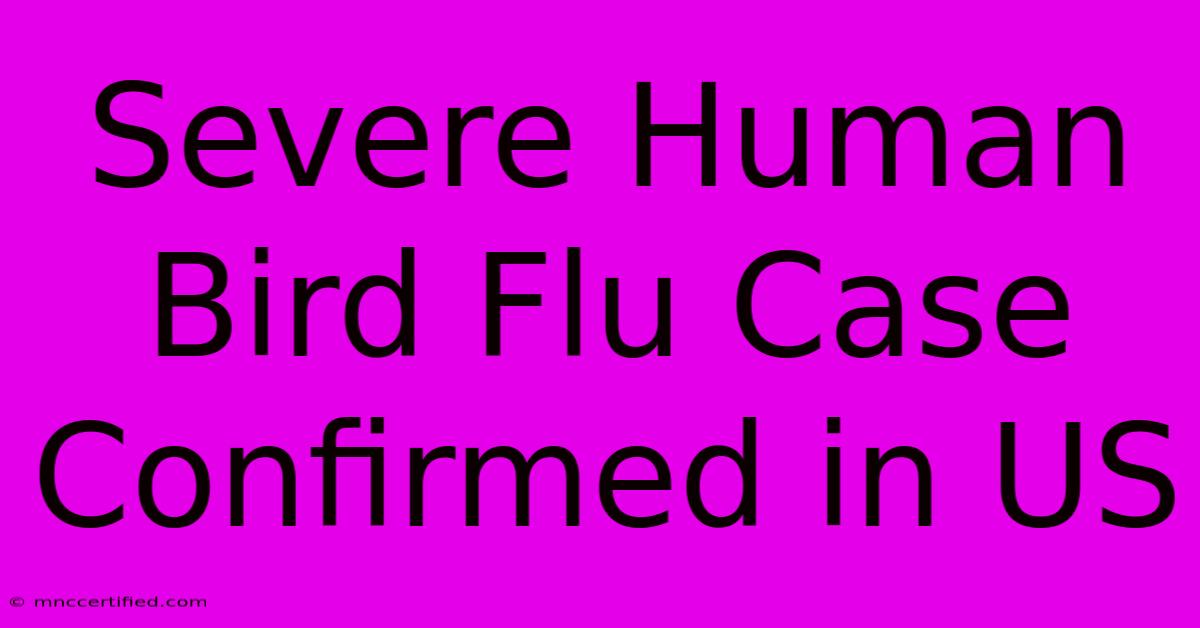Severe Human Bird Flu Case Confirmed In US

Table of Contents
Severe Human Bird Flu Case Confirmed in US: What You Need to Know
The United States has confirmed its first severe case of human infection with the highly pathogenic avian influenza A(H5N1) virus. This alarming development underscores the importance of understanding the risks, prevention strategies, and the ongoing public health response. While the risk to the general public remains low, this case highlights the potential for zoonotic transmission and the need for increased vigilance.
Understanding the H5N1 Virus
Avian influenza, or bird flu, is caused by influenza A viruses that primarily infect birds. The H5N1 subtype is particularly concerning due to its high pathogenicity, meaning it causes severe disease in birds and can potentially pose a serious threat to humans. Transmission to humans typically occurs through direct contact with infected birds (live or dead), or contaminated surfaces. While human-to-human transmission is rare, it's a critical area of ongoing monitoring by public health officials.
Symptoms of H5N1 Infection in Humans
Symptoms of H5N1 infection in humans can vary, but often include:
- Fever
- Cough
- Sore throat
- Muscle aches
- Shortness of breath
- Pneumonia
- Diarrhea
- Vomiting
Severe cases can lead to respiratory failure, acute respiratory distress syndrome (ARDS), and even death. It's crucial to seek immediate medical attention if you experience these symptoms, especially if you have a history of contact with birds.
The Confirmed Case and Public Health Response
The recently confirmed severe case in the US highlights the ongoing threat of avian influenza. Public health agencies are actively working to:
- Identify and trace contacts: Contact tracing is crucial to identify anyone who may have been exposed to the infected individual and to monitor them for symptoms.
- Implement infection control measures: Strict infection control protocols are being implemented in healthcare settings to prevent further spread.
- Enhance surveillance: Increased surveillance of both avian and human influenza is essential to detect and respond to outbreaks quickly.
- Develop and distribute vaccines: While a specific H5N1 vaccine isn't widely available for the general public, research and development are ongoing. Existing influenza vaccines offer some level of cross-protection, but not complete immunity.
Reducing Your Risk
While the risk to the general public is considered low, there are steps you can take to reduce your risk of exposure:
- Avoid contact with birds: This includes wild birds, poultry, and their droppings. Do not touch sick or dead birds.
- Practice good hygiene: Wash your hands thoroughly and frequently with soap and water, especially after being outdoors or handling poultry.
- Cook poultry thoroughly: Ensure poultry is cooked to an internal temperature of 165°F (74°C) to kill any potential viruses.
- Stay informed: Stay updated on the latest information and recommendations from public health authorities like the CDC and WHO.
The Importance of Ongoing Surveillance and Collaboration
This recent case underscores the importance of international collaboration and continued surveillance efforts to monitor and respond to avian influenza outbreaks effectively. Sharing information and resources between countries is critical to preventing future outbreaks and protecting global health. Early detection, rapid response, and robust public health measures are key to mitigating the potential threat of H5N1 and other emerging infectious diseases.
Conclusion: Staying Vigilant Against Avian Influenza
The confirmed severe case of H5N1 in the US serves as a reminder of the ongoing threat posed by avian influenza. While the risk to the average person remains low, vigilance and adherence to preventative measures are crucial. Staying informed, practicing good hygiene, and avoiding contact with birds are essential steps in protecting yourself and your community. Continued research, surveillance, and international cooperation are vital to preventing future outbreaks and safeguarding global public health.

Thank you for visiting our website wich cover about Severe Human Bird Flu Case Confirmed In US. We hope the information provided has been useful to you. Feel free to contact us if you have any questions or need further assistance. See you next time and dont miss to bookmark.
Featured Posts
-
Lillards 600 M Adidas Lifetime Deal
Dec 19, 2024
-
Weather Experts Snow Map Timing
Dec 19, 2024
-
Family Support Wiggins And His Kids
Dec 19, 2024
-
Californians Miss 760 M Mega Millions
Dec 19, 2024
-
Nfl Player Denies Relationship Claims
Dec 19, 2024